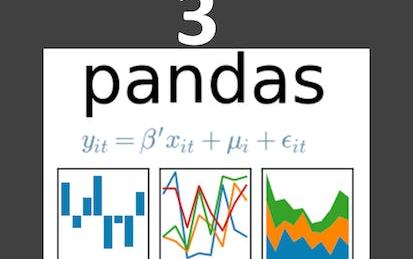

Our Courses

Digital Signal Processing 1: Basic Concepts and Algorithms
Digital Signal Processing is the branch of engineering that, in the space of just a few decades, has enabled unprecedented levels of interpersonal communication and of on-demand entertainment. By reworking the principles of electronics, telecommunication and computer science into a unifying paradigm, DSP is a the heart of the digital revolution that brought us CDs, DVDs, MP3 players, mobile phones and countless other devices. In this series of four courses, you will learn the fundamentals of Digital Signal Processing from the ground up.
-
Course by

-
 Self Paced
Self Paced
-
 29 hours
29 hours
-
 English
English

Computational Thinking & Block Programming in K-12 Education
In the 21st century, computational thinking is a skill critical for all the world's citizens. Computing and technology is impacting all our lives and everyone needs to know how to formulate problems and express their solutions such that a computer can carry it out. In this Specialization you will both learn several block-based languages, but using novel approaches designed to make learning programming easier. Covers most CSTA Algorithms & Programming Standards for Algorithms, Variables, Control, and Modularity: Levels 1-3A.
-
Course by

-
 Self Paced
Self Paced
-
 English
English
Algorithms for Battery Management Systems
In this specialization, you will learn the major functions that must be performed by a battery management system, how lithium-ion battery cells work and how to model their behaviors mathematically, and how to write algorithms (computer methods) to estimate state-of-charge, state-of-health, remaining energy, and available power, and how to balance cells in a battery pack.
-
Course by

-
 Self Paced
Self Paced
-
 English
English

Creating Multi Task Models With Keras
In this 1 hour long guided project, you will learn to create and train multi-task, multi-output models with Keras. You will learn to use Keras' functional API to create a multi output model which will be trained to learn two different labels given the same input example. The model will have one input but two outputs. A few of the shallow layers will be shared between the two outputs, you will also use a ResNet style skip connection in the model. If you are familiar with Keras, you have probably come across examples of models that are trained to perform multiple tasks.
-
Course by

-
 Self Paced
Self Paced
-
 3 hours
3 hours
-
 English
English

Coding for Everyone: C and C++
This Specialization is intended for all programming enthusiasts, as well as beginners, computer and other scientists, and artificial intelligence enthusiasts seeking to develop their programming skills in the foundational languages of C and C++. Through the four courses — two in C, and two in C++ — you will cover the basics of programming in C and move on to the more advanced C++ semantics and syntax, which will prepare you to apply these skills to a number of higher-level problems using AI algorithms and Monte Carlo evaluation in complex games.
-
Course by

-
 Self Paced
Self Paced
-
 English
English

Object Oriented Java Programming: Data Structures and Beyond
This Specialization covers intermediate topics in software development. You’ll learn object-oriented programming principles that will allow you to use Java to its full potential, and you’ll implement data structures and algorithms for organizing large amounts of data in a way that is both efficient and easy to work with. You’ll also practice critically evaluating your own code, and you’ll build technical communication skills that will help you prepare for job interviews and collaborative work as a software engineer.
-
Course by

-
 Self Paced
Self Paced
-
 English
English

Applied Cryptography
This specialization is intended for the learners interested in or already pursuing a career in computer security or other cybersecurity-related fields. Through four courses, the learners will cover the security of information systems, information entropy, classical cryptographic algorithms, symmetric cryptography, asymmetric/public-key cryptography, hash functions, message authentication codes, digital signatures, key management and distribution, and other fundamental cryptographic primitives and protocols.
-
Course by

-
 Self Paced
Self Paced
-
 English
English

Statistical Mechanics: Algorithms and Computations
In this course you will learn a whole lot of modern physics (classical and quantum) from basic computer programs that you will download, generalize, or write from scratch, discuss, and then hand in. Join in if you are curious (but not necessarily knowledgeable) about algorithms, and about the deep insights into science that you can obtain by the algorithmic approach.
-
Course by

-
 Self Paced
Self Paced
-
 16 hours
16 hours
-
 English
English

Unordered Data Structures
The Unordered Data Structures course covers the data structures and algorithms needed to implement hash tables, disjoint sets and graphs. These fundamental data structures are useful for unordered data. For example, a hash table provides immediate access to data indexed by an arbitrary key value, that could be a number (such as a memory address for cached memory), a URL (such as for a web cache) or a dictionary.
-
Course by

-
 Self Paced
Self Paced
-
 21 hours
21 hours
-
 English
English

Cybersecurity Threat Vectors and Mitigation
This course provides a comprehensive overview of threat vectors and the strategies for mitigating them, and aims to equip you with the necessary skills and knowledge to safeguard against cyber threats. You’ll gain a deep understanding of the threat vectors used by attackers, discover encryption techniques, and explore different compliance concepts. This course will get you one step closer to the Microsoft Cybersecurity Analyst Professional Certificate, which requires no degree or prior experience.
-
Course by

-
 Self Paced
Self Paced
-
 20 hours
20 hours
-
 English
English

Natural Language Processing
Natural Language Processing (NLP) is a subfield of linguistics, computer science, and artificial intelligence that uses algorithms to interpret and manipulate human language. This technology is one of the most broadly applied areas of machine learning and is critical in effectively analyzing massive quantities of unstructured, text-heavy data.
-
Course by

-
 Self Paced
Self Paced
-
 English
English

Machine Learning: Theory and Hands-on Practice with Python
In the Machine Learning specialization, we will cover Supervised Learning, Unsupervised Learning, and the basics of Deep Learning. You will apply ML algorithms to real-world data, learn when to use which model and why, and improve the performance of your models. Starting with supervised learning, we will cover linear and logistic regression, KNN, Decision trees, ensembling methods such as Random Forest and Boosting, and kernel methods such as SVM. Then we turn our attention to unsupervised methods, including dimensionality reduction techniques (e.g., PCA), clustering, and recommender systems.
-
Course by

-
 Self Paced
Self Paced
-
 English
English

Data Science Fundamentals
This specialization demystifies data science and familiarizes learners with key data science skills, techniques, and concepts. The course begins with foundational concepts such as analytics taxonomy, the Cross-Industry Standard Process for Data Mining, and data diagnostics, and then moves on to compare data science with classical statistical techniques.
-
Course by

-
 Self Paced
Self Paced
-
 English
English

Geometric Algorithms
Geometric algorithms are a category of computational methods used to solve problems related to geometric shapes and their properties. These algorithms deal with objects like points, lines, polygons, and other geometric figures. In many areas of computer science such as robotics, computer graphics, virtual reality, and geographic information systems, it is necessary to store, analyze, and create or manipulate spatial data.
-
Course by

-
 Self Paced
Self Paced
-
 18 hours
18 hours
-
 English
English

Employee Attrition Prediction Using Machine Learning
In this project-based course, we will build, train and test a machine learning model to predict employee attrition using features such as employee job satisfaction, distance from work, compensation and performance. We will explore two machine learning algorithms, namely: (1) logistic regression classifier model and (2) Extreme Gradient Boosted Trees (XG-Boost). This project could be effectively applied in any Human Resources department to predict which employees are more likely to quit based on their features.
-
Course by

-
 3 hours
3 hours
-
 English
English

Machine Learning and Reinforcement Learning in Finance
The main goal of this specialization is to provide the knowledge and practical skills necessary to develop a strong foundation on core paradigms and algorithms of machine learning (ML), with a particular focus on applications of ML to various practical problems in Finance. The specialization aims at helping students to be able to solve practical ML-amenable problems that they may encounter in real life that include: (1) mapping the problem on a general landscape of available ML methods, (2) choosing particular ML approach(es) that would be most appropriate for resolving the problem, and (3
-
Course by

-
 Self Paced
Self Paced
-
 English
English

Unsupervised Machine Learning for Customer Market Segmentation
In this hands-on guided project, we will train unsupervised machine learning algorithms to perform customer market segmentation.
-
Course by

-
 Self Paced
Self Paced
-
 3 hours
3 hours
-
 English
English

Python Programming Fundamentals
This introductory course is designed for beginners and individuals with limited programming experience who want to embark on their software development or data science journey using Python. Throughout the course, learners will gain a solid understanding of algorithmic thinking, Python syntax, code testing, debugging techniques, and modular code development--essential skills for a successful career in software engineering, development, or data science.
-
Course by

-
 Self Paced
Self Paced
-
 24 hours
24 hours
-
 English
English

Introduction to Applied Cryptography
Cryptography is an essential component of cybersecurity. The need to protect sensitive information and ensure the integrity of industrial control processes has placed a premium on cybersecurity skills in today’s information technology market. Demand for cybersecurity jobs is expected to rise 6 million globally by 2019, with a projected shortfall of 1.5 million, according to Symantec, the world’s largest security software vendor. According to Forbes, the cybersecurity market is expected to grow from $75 billion in 2015 to $170 billion by 2020.
-
Course by

-
 Self Paced
Self Paced
-
 English
English

Parallel programming
With every smartphone and computer now boasting multiple processors, the use of functional ideas to facilitate parallel programming is becoming increasingly widespread. In this course, you'll learn the fundamentals of parallel programming, from task parallelism to data parallelism. In particular, you'll see how many familiar ideas from functional programming map perfectly to to the data parallel paradigm.
-
Course by

-
 Self Paced
Self Paced
-
 33 hours
33 hours
-
 English
English

Prediction and Control with Function Approximation
In this course, you will learn how to solve problems with large, high-dimensional, and potentially infinite state spaces. You will see that estimating value functions can be cast as a supervised learning problem---function approximation---allowing you to build agents that carefully balance generalization and discrimination in order to maximize reward. We will begin this journey by investigating how our policy evaluation or prediction methods like Monte Carlo and TD can be extended to the function approximation setting.
-
Course by

-
 22 hours
22 hours
-
 English
English

Java Programming and Software Engineering Fundamentals
Take your first step towards a career in software development with this introduction to Java—one of the most in-demand programming languages and the foundation of the Android operating system. Designed for beginners, this Specialization will teach you core programming concepts and equip you to write programs to solve complex problems. In addition, you will gain the foundational skills a software engineer needs to solve real-world problems, from designing algorithms to testing and debugging your programs.
-
Course by

-
 Self Paced
Self Paced
-
 English
English

Packet Switching Networks and Algorithms
In this course, we deal with the general issues regarding packet switching networks. We discuss packet networks from two perspectives. One perspective involves external view of the network, and is concerned with services that the network provides to the transport layer that operates above it at the end systems. The second perspective is concerned with the internal operation of a network, including approaches directing information across the network, addressing and routing procedures, as well as congestion control inside the network.
-
Course by

-
 Self Paced
Self Paced
-
 18 hours
18 hours
-
 English
English

Object-Oriented Programming in C++: Functions
This course is the third of five courses aiming to help you to become confident working in the object-oriented paradigm in the C++ language. This specialisation is for individuals who want to learn about objected oriented programming. It's an all-in-one package that will take you from the very fundamentals of C++, all the way to building a crypto-currency exchange platform. During the five courses, you will work with the instructor on a single project: a crypto-currency exchange platform.
-
Course by

-
 Self Paced
Self Paced
-
 10 hours
10 hours
-
 English
English

Meaningful Predictive Modeling
This course will help us to evaluate and compare the models we have developed in previous courses. So far we have developed techniques for regression and classification, but how low should the error of a classifier be (for example) before we decide that the classifier is "good enough"? Or how do we decide which of two regression algorithms is better? By the end of this course you will be familiar with diagnostic techniques that allow you to evaluate and compare classifiers, as well as performance measures that can be used in different regression and classification scenarios.
-
Course by

-
 Self Paced
Self Paced
-
 9 hours
9 hours
-
 English
English



